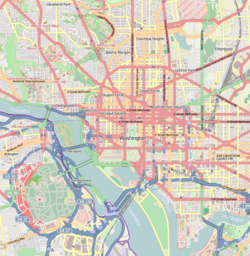Finley General Hospital was a Union Army hospital which operated near Washington, D.C., during the Civil War. It operated from 1862 to 1865.
| Finley General Hospital | |
|---|---|
| Part of military hospitals in the United States | |
| Washington, D.C. | |
 Finley General Hospital looking south in 1864 | |
| Coordinates | 38°54′30″N 77°00′00″W / 38.908325°N 77.000122°W |
| Site information | |
| Controlled by | Union Army |
| Site history | |
| Built | 1862 |
| In use | 1862–1865 |
| Battles/wars | American Civil War |
The hospital was set up with 1,061 beds. On December 17, 1864, 755 beds were occupied.[1]
Location
editThe precise location of the hospital has been lost over time. However, several sources mention it and it is possible to deduct it from these pieces of information.
Walt Whitman mentions it in December 1862 in the Daily Morning Chronicles:
That little town, as you might suppose it, off there on the brow of a hill, is indeed a town, but of wounds, sickness, and death. It is Finley Hospital, northeast of the city, on Kendall Green, as it used to be call'd.[2]
Gallaudet University was established on land donated by United States Postmaster General Amos Kendall and known as Kendall Green in 1856.[3]
In The War Hospitals, John wells Bulkley writes in 1902:
North of Boundary Street, on the Bladensburg Road, near Kendall Green, were a number of wards, supplemented by office and other buildings, and tents, designated as the Finley Hospital, in charge, from July, 1862, to 1865, of Drs. R. A. Bradley, Jr., and G. L. Pancoast.[4]
A clarification is needed regarding the name of the streets:
- Bladensburg Road is not the current Bladensburg Road (known at the time as Bladensburg Pike or Turnpike). It became known as the Old Bladensburg Road and sits were Delaware Avenue crossed Boundary Street.
- Boundary Street was renamed Florida Avenue on January 14, 1890.[5]
Cantonment Sprague (also known as Camp Sprague), occupied by 1st Regiment R.I. Detached Militia was located next to Mrs. Joseph Gales's Mansion (her husband had passed away in 1860). The Eckington General Hospital opened in 1862 and closed in April 1863 when it merged with the adjacent Finley General Hospital.[6]
The map below shows the direction to Glenmont Cemetery which still stands today along with "Bladensburg Road".
A confirmed illustration of Finley Hospital (lithography) from 1864 shows the Capitol Building and the Washington Monument.[7]
-
Eckington Hospital and Kendall Green on an 1862 map of Washington City
-
Plan of Camp Sprague showing it location with regards to the Old Bladensburg Road
-
Detail of "Defenses of Washington, extract of military map of N.E. Virginia : showing forts and roads" showing Old Bladensburg Road
-
1861 map of Washington City showing Camp Sprague
-
Birds eye view of Finley Hospital in 1865
-
Hospital Camp on Kendall Green during the Civil War. This was probably Finley Hospital
See also
editReferences
edit- ^ Civil War Washington - Organization of the Hospitals in the Department of Washington - Table 6: Census of the General Hospitals, Department of Washington, December 17, 1864 - http://civilwardc.org/introductions/other/hospitals.php
- ^ The Walt Whitman Archive - Traveling with the Wounded: Walt Whitman and Washington's Civil War Hospitals https://whitmanarchive.org/criticism/current/anc.00156.html
- ^ "History of Gallaudet University". Gallaudet University. Archived from the original on April 27, 2013. Retrieved July 18, 2012.
- ^ The War Hospitals by John wells Bulkley Surgeon in charge of Patent Office Hospital - page 157 in Washington during war time; a series of paper showing the military, political, and social phases during 1861 to 1865 edited by Marcus Benjamin
- ^ "Boundary Street No longer; it Will Be Known as Florida Avenue in the Future". The Washington Post. January 15, 1890. p. 8.
- ^ "Washington and Georgetown, D.C.," Indexes to Field Records of Hospitals, 1821-1912, Manuscript Record Group 94, National Archives. via Civil War Washington
- ^ Picture on Wikipedia Commons
